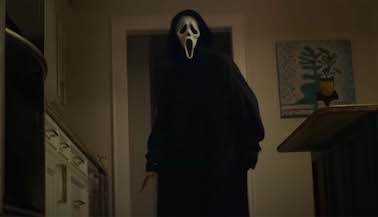|
|
Movie Review: Scream (2022)By Matthew HuntleyJanuary 30, 2022
With that in mind, one of the main rules of a reboot, the movie tells us, is to stay loyal, in some capacity, to the original, lest it upset fans and cause outrage on social media. And so “Scream” (2022) unabashedly rehashes its own formula by once again centering around a mysterious killer who’s stalking and murdering teenagers in the infamous town of Woodsboro, and he/she/them once again dons the trademark Ghostface costume and uses a single knife to stab and cut victims. And just to keep things consistent, the killer, using the signature deep, sinister sounding “Scream” voice, calls those about to be “sliced and diced” beforehand and asks them, “What’s your favorite scary movie?” Now that 25 years have passed since the original, the would-be victims’ answer to the above question has understandably shifted from the classic, simple-minded slasher flicks, such as “Halloween” and “Friday the 13th,” to the modern and sophisticated “elevated horror” entries, such as “The Babadook.” Nevertheless, the would-be victim at the beginning remains the same: a seemingly helpless teenage girl who’s home alone and has a chip on her shoulder. As soon as her landline (remember these?) rings, the torture and killing spree begin, along with the question of who’s doing it and why, which has always been the hook of the “Scream” movies. Even for those unfamiliar with the series, this setup and plot isn’t anything to write home about. At its core, it’s your basic run-of-the-mill horror movie, during which horny and self-centered teenagers get picked off one by one. On the plus side, though, the cast is charming and diverse, even if the fresh-faced actors are all once again too old to be playing high school students (which the movie knows is a joke). We get the new heroine, Sam Carpenter (Melissa Barrera); Sam’s younger sister Tara (Jenna Ortega), the girl who’s “nearly filleted” during the opening sequence; Wes Hicks (Dylan Minnette), whose mom Judy (Marley Shelton) is the local sheriff; Richie Kirsch (Jack Quaid), Sam’s semi-nerdish boyfriend; Mindy (Jasmin Savoy Brown) and Chad Meeks-Martin (Mason Gooding), with Mindy filling the role of her late Uncle Randy (Jamie Kennedy) by explaining the rules of a “requel”; and the seemingly unimportant Amber Freeman (Mikey Madison) and Liv McKenzie (Sonia Ammar). Why did I bother to list the characters’ last names? Because any horror buff will be able to tell you the surnames have a connection to classics from the genre, although I haven’t established them all yet. These new characters are joined by their “legacy” counterparts, all of whom are survivors of the last four movies: Sidney Prescott (Neve Campbell), the formidable, death-defying heroine; Gale Weathers (Courtney Cox), the gossipy former news reporter and author who’s now a congenial morning show host; and Dewey Riley (David Arquette), the bumbling yet dedicated former sheriff of Woodsboro. After the rules of a “requel” are explained to us, it’s clear any one of the characters, new or legacy, could be the killer, and there’s no rhyme or reason as to who it is. The movie simply eliminates the possibilities by systematically presenting one violent and bloody death scene after another until the final showdown, which, you might have guessed, takes place at a remote country house during a keg party, where there are virtually no parents, and the killer finally reveals his/her/their motivation. All the while, the movie brazenly dishes out the typical horror movie devices: an open door filing the frame to make us wonder whether or not Ghostface will suddenly appear behind it once it’s closed; flower vases being used as weapons; the killer’s small knife making an uncommonly loud shrieking sound even though it doesn’t rub up against anything that would warrant such a sound; no one being smart enough to shoot the killer in the head or taking the mask off before the killer has a chance to regain consciousness; phones ringing off the hook; the killer over-explaining his/her/their motives, etc. The movie delivers these conventions in true “Scream” movie fashion, whereby they’re meant to both frighten and generate wink-wink laughs. Like I said, the movie’s way of simultaneously sending up and paying allegiance to the horror genre may prove fresh to “Scream” movie novices, and I really hope it does, because it might incentivize them to watch the original and see it done better. As a veteran viewer of the series, though, this reboot felt like just another run around the same block. The filmmakers seem to think that just because they’re hip, self-aware, and transparent about what the movie is doing that it somehow excuses them from coming up with more innovative ideas—that just because they admit to retrograding old material that it’s okay that they do it. To label “Scream” (2022) “lazy” would be too harsh, because I believe the filmmakers had good intentions and genuinely thought they could revitalize a series they clearly love, and in doing so, rekindle enthusiasm for longtime fans while striking up excitement for new ones. But they rely too heavily on exhausted routines, which render as just sort of ho-hum, and there aren’t enough surprises or new, interesting insights into the concepts of horror movies, sequels, or reboots to make us think “Scream” (2022) had a reason for being, or that the time put into it by the filmmakers and cast was time well spent. Rather, our thoughts are that they had nothing better to do.
|

|
|
|

|
Thursday, October 31, 2024
© 2024 Box Office Prophets, a division of One Of Us, Inc.


